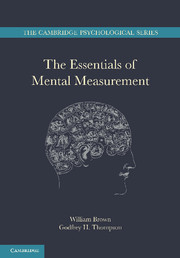Book contents
- Frontmatter
- PREFACE
- Contents
- ERRATA
- PART I PSYCHOPHYSICS
- PART II CORRELATION
- CHAPTER V INTRODUCTION TO CORRELATION
- CHAPTER VI THE MATHEMATICAL THEORY OF CORRELATION
- CHAPTER VII THE INFLUENCE OF SELECTION
- CHAPTER VIII THE CORRECTION OF RAW CORRELATION COEFFICIENTS
- CHAPTER IX THE THEORY OF GENERAL ABILITY
- CHAPTER X A SAMPLING THEORY OF ABILITY
- CHAPTER XI THE PRESENT POSITION (1924)
- CHAPTER XII THE MATHEMATICAL AND EXPERIMENTAL EVIDENCE FOR THE EXISTENCE OF A CENTRAL INTELLECTIVE FACTOR (g)
- CHAPTER XIII A TEST OF THE THEORY OF TWO FACTORS
- CHAPTER XIV RECENT DEVELOPMENTS OF STATISTICAL METHOD IN PSYCHOLOGY
- CHAPTER XV THE FACTORIAL ANALYSIS OF ABILITY
- APPENDIX I TABLES
- APPENDIX II A LIST OF DEFINITE INTEGRALS OF FREQUENT OCCURRENCE IN PROBABILITY WORK
- INDEX
CHAPTER IX - THE THEORY OF GENERAL ABILITY
from PART II - CORRELATION
Published online by Cambridge University Press: 05 June 2016
- Frontmatter
- PREFACE
- Contents
- ERRATA
- PART I PSYCHOPHYSICS
- PART II CORRELATION
- CHAPTER V INTRODUCTION TO CORRELATION
- CHAPTER VI THE MATHEMATICAL THEORY OF CORRELATION
- CHAPTER VII THE INFLUENCE OF SELECTION
- CHAPTER VIII THE CORRECTION OF RAW CORRELATION COEFFICIENTS
- CHAPTER IX THE THEORY OF GENERAL ABILITY
- CHAPTER X A SAMPLING THEORY OF ABILITY
- CHAPTER XI THE PRESENT POSITION (1924)
- CHAPTER XII THE MATHEMATICAL AND EXPERIMENTAL EVIDENCE FOR THE EXISTENCE OF A CENTRAL INTELLECTIVE FACTOR (g)
- CHAPTER XIII A TEST OF THE THEORY OF TWO FACTORS
- CHAPTER XIV RECENT DEVELOPMENTS OF STATISTICAL METHOD IN PSYCHOLOGY
- CHAPTER XV THE FACTORIAL ANALYSIS OF ABILITY
- APPENDIX I TABLES
- APPENDIX II A LIST OF DEFINITE INTEGRALS OF FREQUENT OCCURRENCE IN PROBABILITY WORK
- INDEX
Summary
This apparent unity is illusory. Man, in fact, is a microcosm as complex as the world which is mirrored in his mind; he is a federation incompletely centralised, a hierarchy of numerous and conflicting passions, each of which has ends of its own, and each of which, separately considered, would give a different law of conduct. Be is in some sense a unit, but his unity is such as to include an indefinite number of partly independent sensibilities.
LESLIE STEPHEN, The Science of Ethics, p. 69.Discovery of “Hierarchical” order among correlation coefficients—Use of the formula for the correction of observational errors to prove the existence of a general factor—Researches between 1904 and 1912—A criterion for hierarchical order applied to numerous researches—Complications in the original theory.
DISCOVERY OF HIERARCHICAL ORDER AMONG CORRELATION COEFFICIENTS
THE controversy as to whether ability in any individual is general, or specific, or in groups or “ faculties ” is a very old one, but for the purposes of the present chapter it is not necessary to go back prior to 1904, in which year there was published the first f of a series of articles in which Professor C. Spearman has developed his Theory of General Ability, or Theory of Two Factors, as it is alternatively named.
Professor Spearman's method in that paper was to measure a number of mental abilities, some of them school subjects, others artificial tests, in a number of persons, and calculate the correlation coefficients of each of these activities with each of the others. These correlation coefficients, he then noticed, had a certain relationship among themselves, a relationship which may be called hierarchical order, and is explained in detail later. He saw, quite rightly, that the presence of a general factor would produce this hierarchical order among the coefficients, and, reversing this argument, he concluded that the presence of hierarchical order proved the existence of a general factor.
In this first series of investigations Professor Spearman used the following groups of subjects: 24 village school-children of both sexes, age limits 10•0 to 13•10; 23 boys of a high class preparatory school, age limits 9•5—13•7; and 27 adults of both sexes, age limits 21—78.
- Type
- Chapter
- Information
- The Essentials of Mental Measurement , pp. 164 - 173Publisher: Cambridge University PressPrint publication year: 2013



